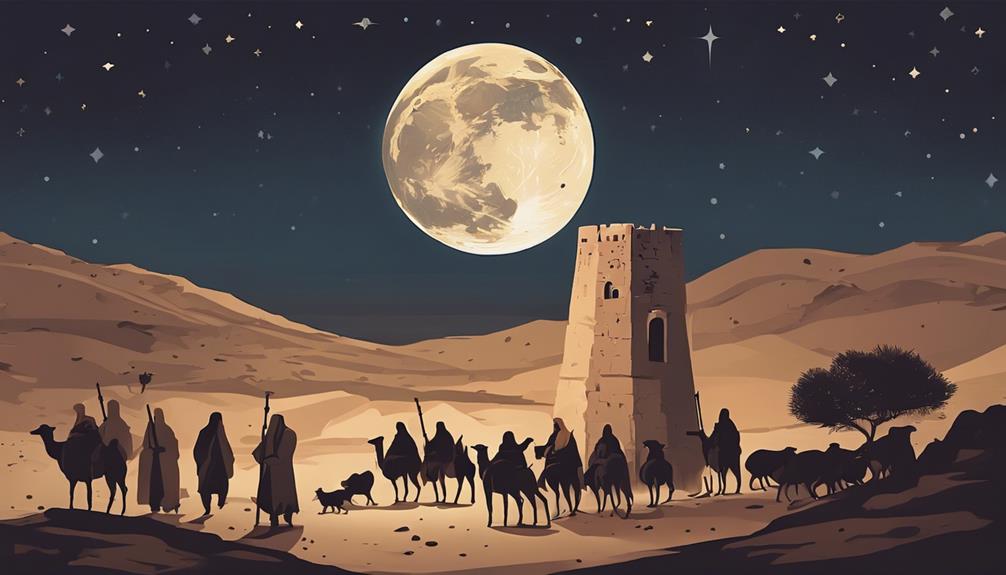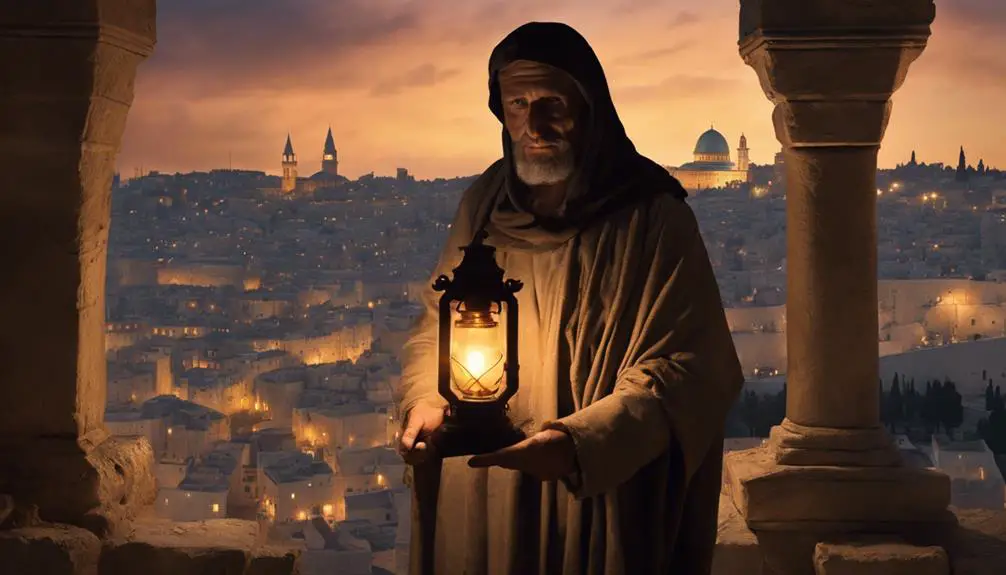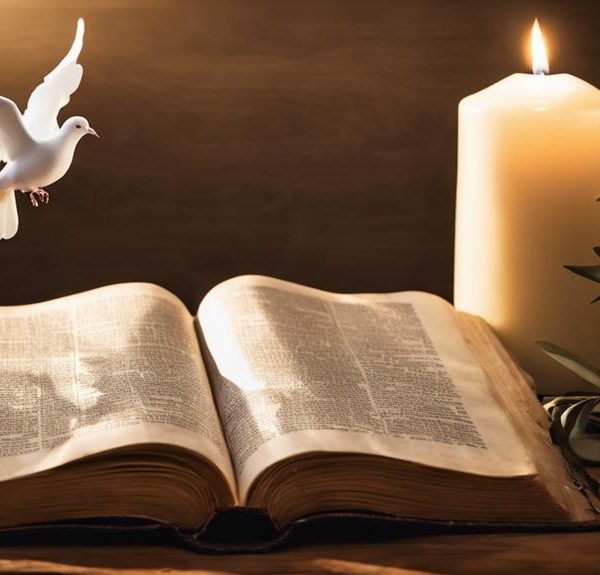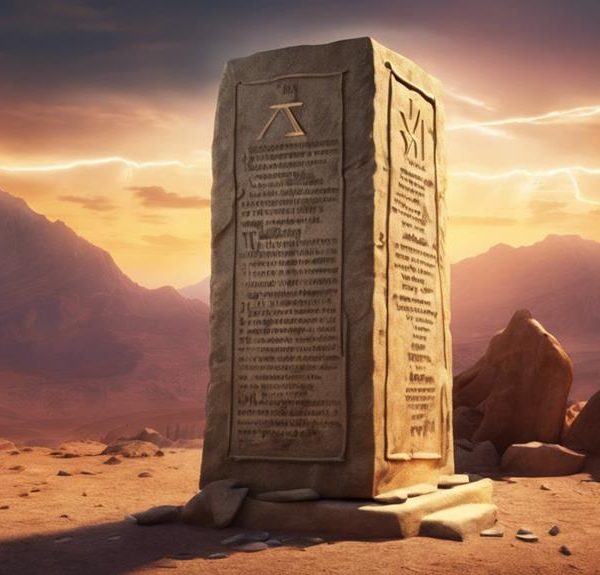Step into the mystery of the Bible's 4th watch, where night meets dawn and profound symbolism unfolds, inviting deeper exploration.

4th Watch in the Bible
Have you ever pondered the real significance behind the 4th watch mentioned in the Bible?
This time, traditionally understood as the last watch of the night before dawn, holds more than just historical context; it's intertwined with pivotal biblical events and rich symbolism.
Exploring its depths, you'll uncover how these moments during the 4th watch have influenced both ancient narratives and modern interpretations.
The symbolism and significance embedded in these narratives might just offer a new perspective on faith and perseverance.
Let's embark on this journey together, and you might find the insights gained to be surprisingly relevant to your own life.
Key Takeaways
- The 4th watch symbolizes the transition from darkness to light, embodying hope and renewal.
- Key biblical events during the 4th watch demonstrate divine authority and intervention.
- This period is associated with significant revelations, spiritual awakening, and personal growth.
- It serves as a metaphor for testing faith, offering divine guidance, and fostering perseverance.
Historical Context of the 4th Watch

In ancient times, the 4th watch denoted the last division of the night, a period deeply intertwined with both the practical aspects of daily life and the symbolic narratives found throughout biblical scripture. This division, rooted in Roman practices, was critical for organizing daily activities, military operations, and religious observances. The Romans divided the night into four watches, a system they inherited from the Greeks, who were influenced by earlier civilizations. This method of dividing the night into watches allowed for a structured approach to timekeeping, significantly before the widespread use of mechanical clocks.
The concept of night divisions wasn't solely about military vigilance or civic order; it permeated various aspects of life, including agriculture, commerce, and the observance of religious rituals. The 4th watch, occurring in the last hours before dawn, held particular significance. It was a time of anticipation, symbolizing the transition from darkness to light, from uncertainty to revelation. This period was seen as both a literal and metaphorical threshold, embodying themes of vigilance, readiness, and the hope of a new day. Through the lens of Roman practices, the 4th watch becomes a rich tapestry of cultural, military, and spiritual dimensions, illustrating the complexity of ancient timekeeping and its enduring legacy in biblical narratives.
Biblical Events During the 4th Watch

Throughout the Bible, several pivotal events occur during the 4th watch, demonstrating its significance as a period of divine intervention and profound revelations. You'll find that this specific time frame, traditionally understood to be between 3 AM and 6 AM, is symbolically rich and historically significant for its portrayal of God's power and presence.
For instance, the storm calming narrative in the Gospels illustrates this period's significance. Jesus, asleep on a boat, is awakened by His disciples amidst a fierce storm. He calms the storm during the 4th watch, showcasing His authority over nature and His role as a protector and savior in times of distress.
Moreover, ghostly encounters, such as Jesus walking on water, also occur during this watch. Disciples, witnessing this event, initially mistake Him for a ghost. This episode not only highlights Jesus' mastery over the physical world but also addresses human fears, offering comfort and revealing divine presence in moments of uncertainty.
These events, occurring during the 4th watch, aren't mere coincidences. They're carefully documented moments where divine intervention is most palpable, underscoring a time of deliverance, revelation, and the transcendence of the divine over the natural order.
Symbolism and Significance

Reflecting on these biblical events during the 4th watch, it's evident that this time period carries profound symbolic and significant meanings within the scriptural narrative. The 4th watch, occurring between 3 am and 6 am, often symbolizes a time of divine intervention and revelation. This timeframe isn't randomly chosen in the Bible; its significance is deeply rooted in both watch meanings and cultural perceptions of the time.
In ancient cultures, the night was divided into watches, and the 4th watch was the last part of the night, just before dawn. This period was traditionally seen as the most challenging part of the night, a time when darkness was most profound, and one's strength was most tested. However, it was also the moment before the dawn, symbolizing hope, renewal, and the coming of light. In this context, the 4th watch represents not just a literal time but a metaphorical space where one's faith is tested before the arrival of relief or revelation.
The cultural perceptions of this period highlight a universal human experience of awaiting the dawn after a long night of struggle, emphasizing themes of perseverance, faith, and divine guidance. These themes resonate deeply within the scriptural narrative, underscoring the 4th watch's significance as a time of both trial and triumph.
Modern Interpretations and Applications

While the 4th watch traditionally symbolizes a time of divine intervention, its principles hold significant relevance for contemporary spiritual practices and interpretations. In modern contexts, you'll find that cultural adaptations and psychological impacts play a crucial role in how individuals and communities perceive and integrate the concept of the 4th watch into their beliefs and daily lives.
Aspect |
Description |
|---|---|
Cultural Adaptations |
Diverse cultures interpret the 4th watch through unique lenses, incorporating it into local traditions and spiritual practices, thus enriching its significance. |
Psychological Impacts |
The idea of the 4th watch can offer comfort and a sense of hope during times of darkness, influencing mental well-being and spiritual resilience. |
Community Engagement |
In many communities, the 4th watch has fostered a sense of unity and collective spiritual awakening, encouraging group prayer and vigilance. |
Personal Growth |
Individuals often report a deepened spiritual awareness and personal growth through the practice of observing or reflecting during the 4th watch. |
These modern interpretations and applications highlight the enduring relevance of the 4th watch in providing a framework for spiritual reflection and growth, regardless of cultural or personal backgrounds.
Personal Reflections and Testimonies

Personal reflections and testimonies frequently provide insightful perspectives on the profound impact that the 4th watch has on individuals' spiritual journeys. These narratives not only enrich our understanding of scriptural principles but also illuminate the diverse ways in which the 4th watch influences faith journeys.
Through the lens of personal experience, three key themes emerge:
- Transformation: Many recount watch experiences as pivotal moments of spiritual awakening or renewal, where the quietude of the night fosters a deeper communion with the divine.
- Guidance: Testimonies often highlight how the 4th watch serves as a unique time for receiving clarity and direction in one's faith journey, amidst the challenges of daily life.
- Empowerment: Individuals frequently describe how these early morning encounters have equipped them with strength and resilience, empowering them to navigate their faith journeys with confidence.
These reflections not only underscore the personal relevance of the 4th watch but also contribute to a broader understanding of its role in shaping spiritual disciplines and practices. By examining these testimonies, one gains a multi-faceted view of the 4th watch's significance in contemporary faith journeys, revealing its enduring relevance in personal spiritual development.
Frequently Asked Questions
How Do Other Religious Texts Outside of the Bible Interpret or Reference the Concept of the 4th Watch?
In exploring how other religious texts interpret the concept similar to the 4th watch, it's crucial to examine naval tradition and historical timelines for context.
Many faiths don't directly reference this period; however, their doctrines often discuss moments of divine intervention or spiritual significance at night or early morning.
Are There Any Specific Health or Psychological Impacts Associated With Waking or Praying During the 4th Watch, According to Modern Science?
Modern science suggests that altering your sleep patterns to wake or pray during early hours might affect you. If you shift your sleep to accommodate prayer habits in the early morning, it can disrupt your natural circadian rhythm. This disruption may lead to sleep deprivation, affecting your mood, cognitive function, and overall health.
However, for some, this practice may also bring psychological comfort or a sense of peace, balancing the potential drawbacks.
Can the Concept of the 4th Watch Be Correlated With Astronomical or Astrological Events, and How Do These Connections Manifest Across Different Cultures?
You're exploring how astronomical or astrological events may correlate with certain practices, focusing on night sky navigation and cultural festivals. Various cultures have historically aligned their activities with the stars, navigating by them or timing festivals to coincide with astronomical events.
These connections manifest in diverse ways, from guiding sailors at sea to determining the dates of significant cultural or religious celebrations, showcasing a deep, universal bond between humanity and the cosmos.
How Do Contemporary Artists, Musicians, or Filmmakers Incorporate the Theme of the 4th Watch Into Their Works?
You'll find that contemporary creators often weave the theme of vigil or nocturnal reflection into their works, symbolizing moments of revelation or transformation.
This motif, through modern interpretations, finds its way into various forms of art, music, and film, utilizing artistic symbolism to convey depth and introspection.
These creators draw from a rich tapestry of cultural and historical references, subtly integrating this theme to explore complex human experiences and emotions.
What Are the Variations in the Interpretation of the 4th Watch Among Different Christian Denominations or in Comparison to Other Major World Religions?
You'll find that interpretations of vigilance during the final hours of the night vary significantly among Christian denominations and other major religions.
This variation isn't just about spiritual watchfulness; it delves into historical contexts and military vigilance, reflecting differing theological perspectives and cultural interpretations.
Analyzing these differences offers insights into how deeply religious traditions and beliefs influence the understanding of symbols and teachings across various faiths.
Conclusion
In conclusion, you've navigated the historical and biblical depths of the 4th watch, uncovering its events, symbolic meanings, and contemporary relevance.
Through scholarly analysis, it's clear that this period holds significant weight, both in scriptural narratives and in inspiring modern faith practices.
Your exploration has revealed the 4th watch's role as a time of divine intervention and reflection, offering rich insights for personal and collective spiritual journeys.
Thus, it remains a pivotal concept in understanding biblical times and their impact on today's faith experiences.



Sign up